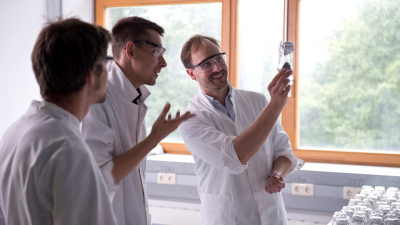Page path:
- Home
- Discover
- Archive News
- News 2020
- algal steroids
Geological alteration of algal steroids mimics early animal signatures
Dr. Benjamin Nettersheim and Dr. Christian Hallmann from the Max Planck Research Group Organic Palaeobiogeochemistry at the Max Planck Institute for Biogeochemistry in Jena and from MARUM - Center for Marine Environmental Sciences at the University of Bremen are involved in the two studies now published.
Original publications:
Bobrovskiy, I. et al. Algal origin of sponge sterane biomarkers negates the oldest evidence for animals in the rock record. Nature Ecology & Evolution (2020), DOI:10.1038/s41559-020-01334-7
Van Maldegem, L. M., Nettersheim, B.J. et al. Geological alteration of Precambrian steroids mimics early animal signatures. Nature Ecology & Evolution (2020), DOI:10.1038/s41559-020-01336-5



